Related Research Articles

Like its Eastern Caribbean neighbours, the main priority of Dominica's foreign relations is economic development. The country maintains missions in Washington, New York, London, and Brussels and is represented jointly with other Organisation of Eastern Caribbean States (OECS) members in Canada. Dominica is also a member of the Caribbean Development Bank (CDB), Organisation internationale de la Francophonie, and the Commonwealth of Nations. It became a member of the United Nations and the International Monetary Fund (IMF) in 1978 and of the World Bank and Organization of American States (OAS) in 1979.

The Republic of Estonia gained its independence from the Russian Empire on 24 February 1918 and established diplomatic relations with many countries via membership of the League of Nations. The forcible incorporation of Estonia into the Soviet Union in 1940 was not generally recognised by the international community and the Estonian diplomatic service continued to operate in some countries. Following the restoration of independence from the Soviet Union, Russia was one of the first nations to re-recognize Estonia's independence. Estonia's immediate priority after regaining its independence was the withdrawal of Russian forces from Estonian territory. In August 1994, this was completed. However, relations with Moscow have remained strained primarily because Russia decided not to ratify the border treaty it had signed with Estonia in 1999.
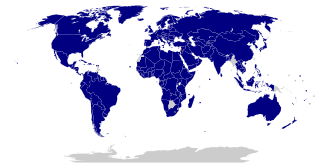
The foreign policy of Lebanon reflects its geographic location, the composition of its population, and its reliance on commerce and trade. Until 2005, Lebanon's foreign policy had been heavily influenced by Syria. The framework for relations was first codified in May 1991, when Lebanon and Syria signed a treaty of mutual cooperation. This treaty came out of the Taif Agreement, which stipulated that "Lebanon is linked to Syria by distinctive ties deriving strength from kinship, history, and common interests." The Lebanese-Syria treaty calls for "coordination and cooperation between the two countries" that would serve the "interests of the two countries within the framework of sovereignty and independence of each." Numerous agreements on political, economic, security, and judicial affairs have followed over the years.
The foreign relations of Norway are based on the country's membership in NATO and within the workings of the United Nations (UN). Additionally, despite not being a member of the European Union (EU), Norway takes a part in the integration of EU through its membership in the European Economic Area. Norway's foreign ministry includes both the minister of foreign affairs and minister of international development.
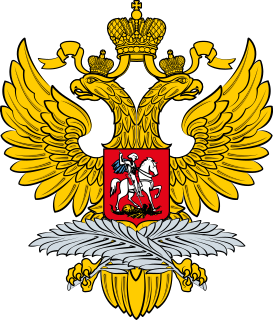
The Ministry of Foreign Affairs of the Russian Federation is the central government institution charged with leading the foreign policy and foreign relations of Russia. It is a continuation of the Ministry of Foreign Affairs of the Russian Soviet Federative Socialist Republic, which was under the supervision of the Soviet Ministry of External Relations. Sergei Lavrov is the current foreign minister.

Gideon Meir was an Israeli diplomat. He served as its ambassador to Italy from 2006 until 2012. He was noted for being part of the negotiating team that drafted the Egypt–Israel peace treaty in 1979.
Niue maintains diplomatic relations with various other countries and multilateral organizations.

The Embassy of Australia in Moscow is the diplomatic mission of Australia to the Russian Federation. The current head of post and Ambassador of Australia to the Russian Federation is Graeme Meehan. The embassy serves as the diplomatic mission for Australia to the Russian Federation, Armenia, Belarus, Kazakhstan, Kyrgyzstan, Tajikistan, Turkmenistan and Uzbekistan. The chancery is located at 10A/2 Podkolokolny Lane in the Tagansky District of Moscow.

The Israeli Ministry of Foreign Affairs is one of the most important ministries in the Israeli government. The ministry's role is to implement Israel's foreign policy, and promote economic, cultural, and scientific relations with other countries.
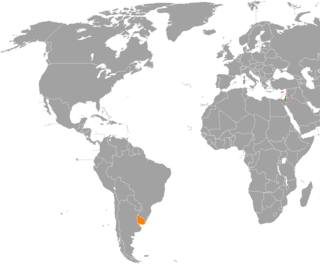
Israel–Uruguay relations are foreign relations between Israel and Uruguay. Uruguay was the first South American country to recognize Israel.
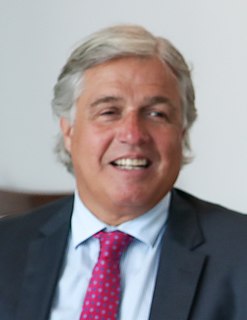
Francisco Carlos Bustillo Bonasso is a Uruguayan diplomat, serving as Minister of Foreign Relations of Uruguay since July 6, 2020.
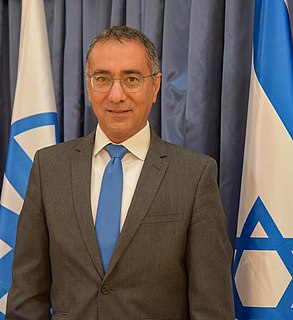
Gilad Cohen is an Israeli diplomat in the Israel Ministry of Foreign Affairs. Cohen serves as the Ambassador of Israel to Japan since October 2021. From 2017 to 2021, he served as the Deputy Director General for Asia and Pacific division at the Israel Ministry of Foreign Affairs. From 2014 to 2017, he served as the Deputy Director General for Coordination and Policy Planning, in the Israel Foreign Ministry.

Yosef Govrin was an Israeli diplomat who served in Israel's Foreign Service between 1953 and 1995.
Gennady Vasilyevich Sizov was a Soviet and Russian diplomat. He served in various diplomatic roles from 1971 onwards, and was ambassador of Russia to Bolivia between 1998 and 2003.
References
- 1 2 Sufott, E. Zev (December 14, 2007). "Yeshayahu Anug Will Be Remembered as Key Early Diplomat". Haaretz. Retrieved 10 August 2021.
- ↑ "Exchange of Notes between Canada and Israel Further Amending the Schedule Of Routes Annexed To The February 10, 1971 Commercial Air Services Agreement As Amended On December 10, 1976". Treaties. The Government of Cananda. Retrieved 10 August 2021.
- ↑ Jenkins, Loren (July 27, 1988). "ISRAEL SENDS 6-MEMBER MISSION TO MOSCOW". The Washington Post. Retrieved 11 August 2021.
- ↑ "Uruguay". Israeli Ministry of Foreign Affairs. Retrieved 10 August 2021.